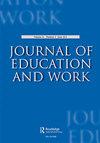高等教育学生课外活动的动机:来自英国大学的证据
IF 1.7
Q2 EDUCATION & EDUCATIONAL RESEARCH
引用次数: 2
摘要
摘要:高等教育学生必须在课程成就之外展示自己的价值,才能在竞争日益激烈的劳动力市场中找到工作。本文将注意力集中在课外活动上,因为单向学生可以这样做,本文使用动机视角来考察是什么驱使学生参与课外活动,以及早期和晚期学生的动机是如何变化的。我们对一所92后扩大参与度大学的学生进行了46次深入访谈,发现四种动机——外在、内在、社会和亲社会——解释了课外参与。课外活动的动机各不相同;外在动机在就业、学术、社会和志愿者课外活动中表现突出;内在动机和社会动机对体育和社会至关重要;以及学术、志愿服务和社会课外活动的亲社会动机。此外,我们发现初年级和大四学生的动机之间存在重要差异,这表明动机在整个大学旅程中各不相同。我们的论文为高等教育中的课外活动文献做出了贡献,为在当前市场化的高等教育环境中推动学生参与(不同)活动的动机提供了新的证据,并将学习水平确定为塑造课外参与动机的重要边界条件。本文章由计算机程序翻译,如有差异,请以英文原文为准。
Higher education student motivations for extracurricular activities: evidence from UK universities
ABSTRACT Higher education students are required to demonstrate value beyond their curricula achievements to secure jobs in increasingly competitive labour markets. Focusing on extracurricular activities as one-way students can do so, this paper uses a motivation perspective to examine what drives students to engage in extracurricular activities, and how student motivation varies between early and late-stage students. We conducted 46 in-depth interviews with students in a post-92 widening-participation university and found that four motivations – extrinsic, intrinsic, social, and pro-social – explained extracurricular participation. The motivations varied across types of extracurricular activities; extrinsic motivation was prominent for employment, academic, society and volunteering extracurriculars; intrinsic and social motivations were vital for sports and societies; and pro-social motivation for academic, volunteering, and society extracurriculars. Moreover, we found important differences between the motivations of early-year and final-year students, suggesting that motivations vary across the university journey. Our paper contributes to the literature on extracurricular activities within higher education by providing new evidence on the motivations that propel students to engage in (different) activities in the current marketised higher education environment and by identifying the level of study as an important boundary condition shaping motivations for extracurricular participation.
求助全文
通过发布文献求助,成功后即可免费获取论文全文。
去求助
来源期刊

Journal of Education and Work
EDUCATION & EDUCATIONAL RESEARCH-
CiteScore
2.70
自引率
14.30%
发文量
40
期刊介绍:
The Journal of Education and Work is an international forum for academic research and policy analysis which focuses on the interplay of the education and economic systems. The journal examines how knowledge, skills, values and attitudes both about and for work and employment are developed within the education system. The journal also explores the various forms of industrial training and accreditation in the economic system, including changes in the economic and industrial infrastructure which influence the type of employees required. Work in the informal economy is also included.
 求助内容:
求助内容: 应助结果提醒方式:
应助结果提醒方式:


